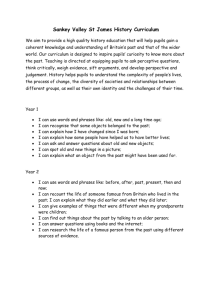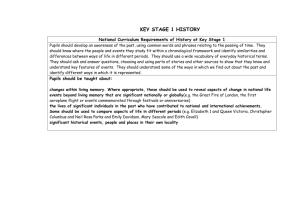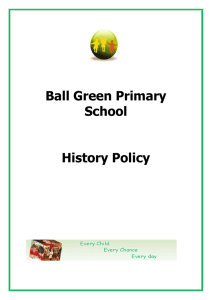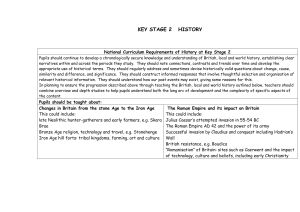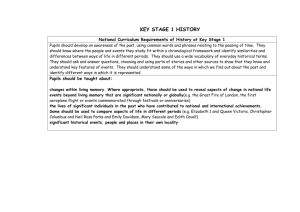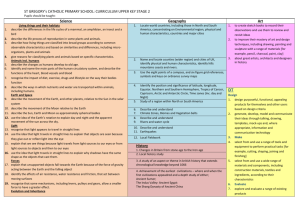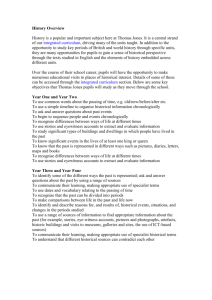History Curriculum Objectives
advertisement
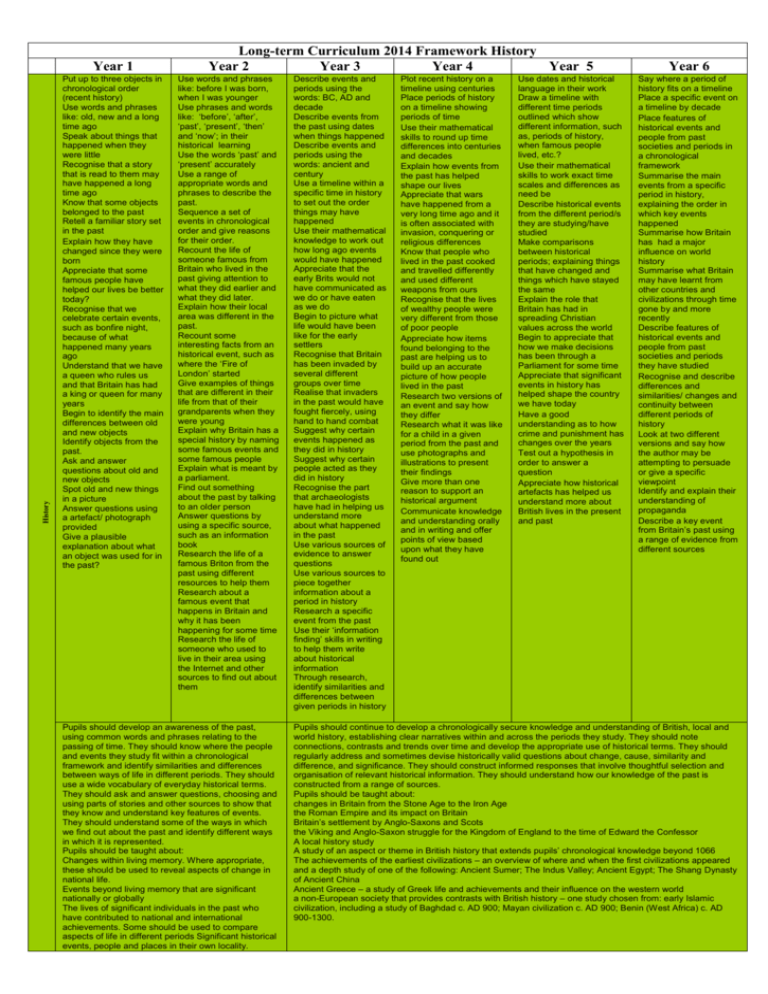
History Year 1 Put up to three objects in chronological order (recent history) Use words and phrases like: old, new and a long time ago Speak about things that happened when they were little Recognise that a story that is read to them may have happened a long time ago Know that some objects belonged to the past Retell a familiar story set in the past Explain how they have changed since they were born Appreciate that some famous people have helped our lives be better today? Recognise that we celebrate certain events, such as bonfire night, because of what happened many years ago Understand that we have a queen who rules us and that Britain has had a king or queen for many years Begin to identify the main differences between old and new objects Identify objects from the past. Ask and answer questions about old and new objects Spot old and new things in a picture Answer questions using a artefact/ photograph provided Give a plausible explanation about what an object was used for in the past? Long-term Curriculum 2014 Framework History Year 2 Year 3 Year 4 Year 5 Use words and phrases like: before I was born, when I was younger Use phrases and words like: ‘before’, ‘after’, ‘past’, ‘present’, ‘then’ and ‘now’; in their historical learning Use the words ‘past’ and ‘present’ accurately Use a range of appropriate words and phrases to describe the past. Sequence a set of events in chronological order and give reasons for their order. Recount the life of someone famous from Britain who lived in the past giving attention to what they did earlier and what they did later. Explain how their local area was different in the past. Recount some interesting facts from an historical event, such as where the ‘Fire of London’ started Give examples of things that are different in their life from that of their grandparents when they were young Explain why Britain has a special history by naming some famous events and some famous people Explain what is meant by a parliament. Find out something about the past by talking to an older person Answer questions by using a specific source, such as an information book Research the life of a famous Briton from the past using different resources to help them Research about a famous event that happens in Britain and why it has been happening for some time Research the life of someone who used to live in their area using the Internet and other sources to find out about them Pupils should develop an awareness of the past, using common words and phrases relating to the passing of time. They should know where the people and events they study fit within a chronological framework and identify similarities and differences between ways of life in different periods. They should use a wide vocabulary of everyday historical terms. They should ask and answer questions, choosing and using parts of stories and other sources to show that they know and understand key features of events. They should understand some of the ways in which we find out about the past and identify different ways in which it is represented. Pupils should be taught about: Changes within living memory. Where appropriate, these should be used to reveal aspects of change in national life. Events beyond living memory that are significant nationally or globally The lives of significant individuals in the past who have contributed to national and international achievements. Some should be used to compare aspects of life in different periods Significant historical events, people and places in their own locality. Describe events and periods using the words: BC, AD and decade Describe events from the past using dates when things happened Describe events and periods using the words: ancient and century Use a timeline within a specific time in history to set out the order things may have happened Use their mathematical knowledge to work out how long ago events would have happened Appreciate that the early Brits would not have communicated as we do or have eaten as we do Begin to picture what life would have been like for the early settlers Recognise that Britain has been invaded by several different groups over time Realise that invaders in the past would have fought fiercely, using hand to hand combat Suggest why certain events happened as they did in history Suggest why certain people acted as they did in history Recognise the part that archaeologists have had in helping us understand more about what happened in the past Use various sources of evidence to answer questions Use various sources to piece together information about a period in history Research a specific event from the past Use their ‘information finding’ skills in writing to help them write about historical information Through research, identify similarities and differences between given periods in history Plot recent history on a timeline using centuries Place periods of history on a timeline showing periods of time Use their mathematical skills to round up time differences into centuries and decades Explain how events from the past has helped shape our lives Appreciate that wars have happened from a very long time ago and it is often associated with invasion, conquering or religious differences Know that people who lived in the past cooked and travelled differently and used different weapons from ours Recognise that the lives of wealthy people were very different from those of poor people Appreciate how items found belonging to the past are helping us to build up an accurate picture of how people lived in the past Research two versions of an event and say how they differ Research what it was like for a child in a given period from the past and use photographs and illustrations to present their findings Give more than one reason to support an historical argument Communicate knowledge and understanding orally and in writing and offer points of view based upon what they have found out Use dates and historical language in their work Draw a timeline with different time periods outlined which show different information, such as, periods of history, when famous people lived, etc.? Use their mathematical skills to work exact time scales and differences as need be Describe historical events from the different period/s they are studying/have studied Make comparisons between historical periods; explaining things that have changed and things which have stayed the same Explain the role that Britain has had in spreading Christian values across the world Begin to appreciate that how we make decisions has been through a Parliament for some time Appreciate that significant events in history has helped shape the country we have today Have a good understanding as to how crime and punishment has changes over the years Test out a hypothesis in order to answer a question Appreciate how historical artefacts has helped us understand more about British lives in the present and past Year 6 Say where a period of history fits on a timeline Place a specific event on a timeline by decade Place features of historical events and people from past societies and periods in a chronological framework Summarise the main events from a specific period in history, explaining the order in which key events happened Summarise how Britain has had a major influence on world history Summarise what Britain may have learnt from other countries and civilizations through time gone by and more recently Describe features of historical events and people from past societies and periods they have studied Recognise and describe differences and similarities/ changes and continuity between different periods of history Look at two different versions and say how the author may be attempting to persuade or give a specific viewpoint Identify and explain their understanding of propaganda Describe a key event from Britain’s past using a range of evidence from different sources Pupils should continue to develop a chronologically secure knowledge and understanding of British, local and world history, establishing clear narratives within and across the periods they study. They should note connections, contrasts and trends over time and develop the appropriate use of historical terms. They should regularly address and sometimes devise historically valid questions about change, cause, similarity and difference, and significance. They should construct informed responses that involve thoughtful selection and organisation of relevant historical information. They should understand how our knowledge of the past is constructed from a range of sources. Pupils should be taught about: changes in Britain from the Stone Age to the Iron Age the Roman Empire and its impact on Britain Britain’s settlement by Anglo-Saxons and Scots the Viking and Anglo-Saxon struggle for the Kingdom of England to the time of Edward the Confessor A local history study A study of an aspect or theme in British history that extends pupils’ chronological knowledge beyond 1066 The achievements of the earliest civilizations – an overview of where and when the first civilizations appeared and a depth study of one of the following: Ancient Sumer; The Indus Valley; Ancient Egypt; The Shang Dynasty of Ancient China Ancient Greece – a study of Greek life and achievements and their influence on the western world a non-European society that provides contrasts with British history – one study chosen from: early Islamic civilization, including a study of Baghdad c. AD 900; Mayan civilization c. AD 900; Benin (West Africa) c. AD 900-1300.
